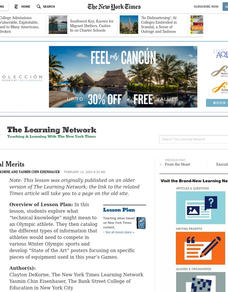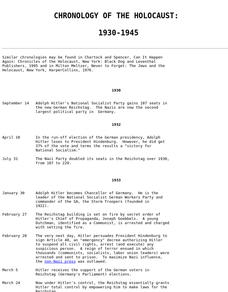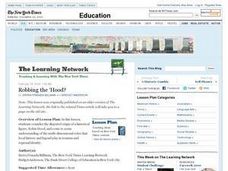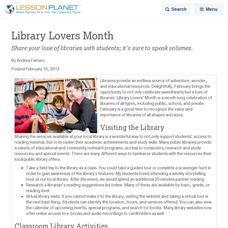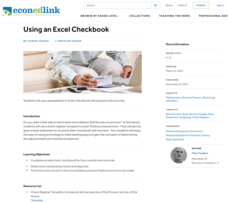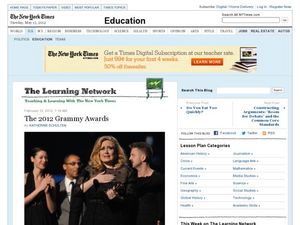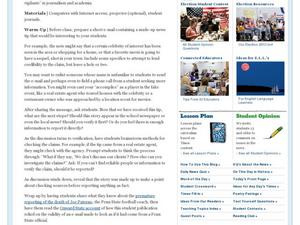Curated OER
Technical Merits
What is technical knowledge? The class explores what technical knowledge might mean to an Olympic athlete. They catalog the different types of information that athletes would need to compete in various Winter Olympic sports and develop...
Curated OER
Does Mother Nature Know Best?
Investigate herbal medicine in the science or health classroom with this lesson from the New York Times. After a discussion about class members beliefs about and experiences with herbal medicines, pupils read an article that might impact...
Curated OER
A Chronology of the Holocaust
A straightforward chronology of the Holocaust lists events from 1930 to 1945. Connects to a page with links to extensive resources and information about the Holocaust. Use as a resource for student inquiry into the Holocaust.
Curated OER
1704 Attack on Deerfield
Class groups examine conflicting primary and secondary sources describing the 1704 attack on the fort at Deerfield by French and Native Americans and analyze the implications of discrepancies.
Curated OER
Susan B. Anthony Day
The history of women's suffrage and Susan B. Anthony are examined in this social studies instructional activity. Third and fourth graders participate in a simulation of a vote, develop slogans for women's suffrage, complete a KWL chart,...
Curated OER
Robbing the 'Hood?
Students investigate historical figures and how they play a role in tourism by reading and discussing the article "When Robin Hood Supped, Was it Yorkshire Pudding?" In groups, students investigate issues related in the article in...
Curated OER
Is Everyone Protected by the Bill of Rights?
Who is protected by the Bill of Rights? Learners examine the Bill of Rights and conduct research regarding gay people in the military. They use their research findings to prepare for and participate in a debate regarding the military ban...
Curated OER
Narrative Writing: Using Exact Words
Review the narrative writing process with your emerging story writers. They read a sample narrative and identify five vague verbs that could be replaced with a more exact, exciting verb. Then they write a personal narrative making sure...
Curated OER
The Revolutions of 1848
1848 was a hot year for Europe, which endured political tumult and upheaval after years of tension buildup. This presentation details the circumstances surrounding revolutions in France, Austria-Hungary, Romania, Italy, Prussia, and...
Curated OER
Thomas Edison's Bright Ideas
Thomas Alva Edison may be one of the most well-known scientists to elementary or middle schoolers. Use his story to show that he invented more than just the light bulb and to inspire youngsters to work hard! You could use this on the...
Curated OER
Library Lovers Month
Share your love of libraries with students; it's sure to speak volumes.
Council for Economic Education
Using an Excel Checkbook
High school is the time that many scholars get their first jobs. Help young entrepreneurs apply economic principles to crucial skills for their new jobs and for functioning in society in general. They use Excel to balance a checkbook by...
Curated OER
The Care and Feeding of Kids: Finding Information on Nutrition and Fitness
The Learning Network is featuring an article about First Lady Michelle Obama and her quest to help reduce childhood obesity in America. The article talks about how she has talked with the top three suppliers of school lunches and has...
Curated OER
The Violence in Syria
Several New York Times articles were used to create informative reading material. Kids click on each of the embedded links to access a resource related to Syria and the Middle East conflict. They then answer the nine questions. Note:...
Curated OER
How Does Your Garden Grow? Discovering How Weather Patterns Affect Natural Cycles
For the warm-up in this cool climate lesson, you will need to click on "Mapping" and then "US Mapping" once you arrive at NOAA's "US Climate at a Glance" page. Earth science explorers realize that 2012 was a warm winter for us. They read...
Curated OER
The 2012 Grammy Awards
Kids answer 11 who, what, when, where, and why questions after reading a New York Times article about the Grammy Awards. Boosting reading comprehension by reading about a topical event keeps pupils informed and interested. A related blog...
Curated OER
The Value of Facebook
Does Facebook actually have any value? Find out what the New York Times thinks by reading this informational article. Learners use the 10 guiding questions to aid them as the read the provided article regarding the value of Facebook. Two...
Curated OER
Do College Rankings Matter?
How do you know which college is for you? Upper graders consider multiple factors about the college application process, the college system, and how colleges are ranked. They read a New York Times article on the subject then compose blog...
Curated OER
Proposition 8 Struck Down
Have your class examine the issues surrounding same-sex marriage, civil rights, and proposition 8. They read a New York Times article entitled "Proposition 8 Struck Down" and then answer 10 who, what, when, where, and why questions....
Curated OER
Student Opinion: Who Inspires You?
Inspire your class to write about role models and personal heroes with this resource from The Learning Network. Class members read a New York Times article excerpt about basketball star Jeremy Lin and how he inspired the author. After...
Curated OER
Lin at Home and Abroad
What is so amazing about Jeremy Lin? Read the following New York Times article and find out. The article and 13 comprehension questions regarding this basketball super star are awaiting your eager readers.
Curated OER
It's All an Allusion: Identifying Allusions, in Literature and in Life
To allude, or not to allude, that is the question: whether ‘tis better to make a reference and engage your audience or risk confusing them or sounding dated. After reading an article about, and loaded with allusions, class members take a...
Curated OER
Easy Access: Creating Annotated Versions of News Articles
How can news coverage be made more accessible for teens? Model for your class how to use technology to annotate news stories containing unfamiliar references that hinder their interest in and understanding of a news story. Use the...
Curated OER
Check It Out: Verifying Information and Sources in News Coverage
If it’s in the news it must be true, right? Prompted by a New York Times article, class members consider the importance of accuracy in reporting and validating sources. The detailed plan includes warm-up exercises, discussion questions,...
Other popular searches
- February 24
- February 14
- February 19
- February 16
- February 23
- February 11
- February 2
- Leap Year February 29
- February 18
- February Activity
- Preschool Themes February
- President Day February 2008


